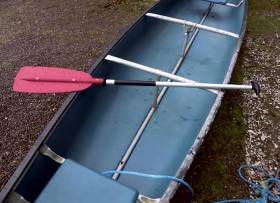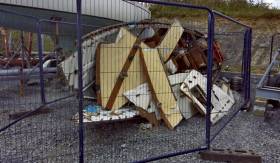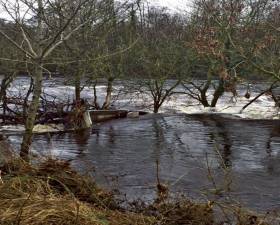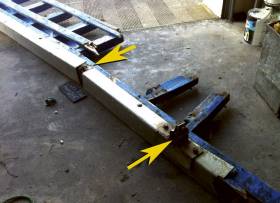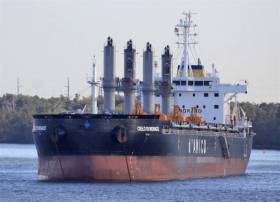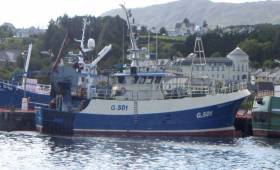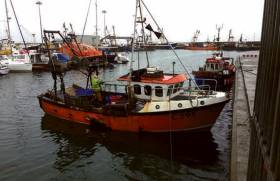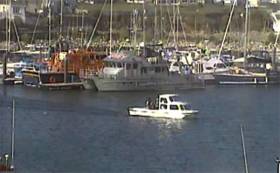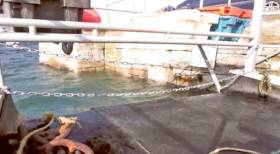Displaying items by tag: MCIB
Basic Safety Measures Not Taken Ahead Of Kenmare Canoe Drowning - MCIB
#MCIB - Basic water safety precautions were not taken before a canoe capsize incident that led to the drowning of a man off Kenmare almost a year ago.
That’s the main conclusion of the official report into the tragedy in Kenmare Bay in which local man Bill Topham died, as previously reported on Afloat.ie.
Topham had been canoeing to islands in Kenmare Bay with a friend for a duck shoot when their two-man vessel overturned in high winds on the afternoon of 31 January 2016.
The Marine Casualty Investigation Board report identified that neither passenger on the canoe was wearing a personal flotation device.
It also concluded that their decision to undertake their trip amid adverse weather conditions with a fully laden canoe, including two boisterous dogs, greatly increased the “inevitable element of natural risk” involved.
The full MCIB report into the incident is available to download below.
Loose Gas Hose Likely Culprit In ‘Pegasus’ Explosion
#MCIB - A loose gas hose is the most likely cause of an explosion that sank a restored classic yacht in Galway Bay earlier this year, according to the official investigation into the incident.
As previously reported on Afloat.ie, an attempt to boil a kettle almost ended in tragedy with the blast on board the 26ft sloop Pegasus on Saturday 9 April, just months after her first full season following relaunch.
Both sailors on board — the owner and a colleague — survived the incident, with the former treated for burns to his hands, though the boat itself was destroyed.
Investigators from the Marine Casualty Investigation Board (MCIB) determined that the explosion was most likely caused by a build-up of gas in the bilges of the boat over a number of minutes after the cockpit valve was turned on, which ignited when the owner struck a match to light the newly installed stove.
While the MCIB report was not able to determine the exact layout of the gas cylinder, regulator and hose connected to the cooker prior to the incident, it was found that the hose itself was too large for its connections despite being clamped, and had likely loosened some time before, allowing gas to leak.
The investigation also noted that the vessel had no gas alarm, which would have given ample warning of a leak to those on board.
The full MCIB report is available to download below.
Boating Under Influence Led To Shannon Tragedy Says MCIB Report
#MCIB - The dangers of boating while under the influence have been highlighted in the official report into an incident on the Shannon near Limerick city earlier this year.
One man died and three others were hospitalised after their boat capsized north-east of Limerick city in the early hours of Thursday 4 February, as previously reported on Afloat.ie.
The official report into the incident by the Marine Casualty Investigation Board (MCIB) has found that the four men, none of whom had any boating experience, were under the influence of alcohol and/or drugs when they took the boat from Castleconnell Boat Club shortly before 4am.
The small aluminium boat had its drain plug removed, as is standard when storing such boats ashore, and quickly began taking on water as the four men paddled to an area known as the Gap of the Dam, where the river narrows, and into a torrent fed by heavy rainfall in the previous fortnight.
Losing control of the boat as they guided it to trees on a spit of land in the river, it grounded on submerged rocks and capsized, throwing all four men into the water. None were wearing lifejackets.
One man caught his leg under the capsized boat, another was swept away while attempting to lift the boat off his friend, and a third became entangled in undergrowth after losing his footing, while the fourth managed to contact emergency services with his mobile phone after several attempts.
Gardaí and teams from the Limerick Fire Service and Killaloe Coast Guard arrived between 4:35am and 4:45am but faced great difficulty mounting a rescue attempt due to the fast-flowing water and low light conditions, though all four were recovered by 7am.
Two firemen were commended by the MCIB for their courage in staying in the water for over two hours to assist the man trapped in undergrowth, though he was unresponsive when finally recovered from the water and later pronounced dead due to drowning at Limerick University Hospital.
Impaired judgement due to drugs and/or drink taken over a number of hours was cited as the main factor in the tragedy by the MCIB, explaining the men’s recklessness in taking out a boat in darkness with no experience and lacking safety gear.
The board recommends the issue of a Marine Notice reminding the public of the dangers of operating any water craft under the influence.
The full report from the MCIB is available to download below.
Investigation Into Death Of Fisherman On Prawn Trawler
#Fishing - Authorities are investigating the circumstances surrounding the death of an Egyptian crewman on a fishing trawler off the Co Clare coast on Tuesday night (8 November).
According to The Irish Times, the 53-year-old deckhand was injured in an incident on the trawler Endurance while hauling prawn nets off the Porcupine Bank.
Guard are treating the death as an accident, and an investigator from the Marine Casualty and Investigation Board has been assigned to the inquiry.
#MCIB - Small fishing craft used for non-commercial potting must comply with the code of practice for recreational craft, investigators have warned in their report on the death of a fisherman in an incident off the Mayo coast last year.
Daniel Doherty went missing after his fishing boat Cara Rose sustained significant structural damage while hauling pots, and beached at Benwee Head north-east of Belmullet on 11 September 2015.
The 23-year-old’s body was recovered two weeks later some eight nautical miles off Downpatrick Head.
The report into the incident by the Marine Casualty Investigation Board (MCIB) found that the vessel suffered structural failure caused by the improper fitting of a hydraulic pot hauler by Doherty, who purchased the boat in 2014 but did not obtain any safety certification.
It was also found that Doherty, who may not have been wearing a personal flotation device (PFD), regularly sailed from Rinroe Pier to bait and haul pots in Broadhaven Bay with only occasional mobile phone contact with a relative on land — contact that would have been unavailable while operating in the shadow area where the boat was found.
While there was a VHF radio operational on the vessel, it did not have the required licence or call sign.
The MCIB report concluded that had Doherty been wearing a PFD and been carrying a personal locator beacon, it’s likely he would have been visible to search teams who began their operation within minutes of the alarm being raised.
Also highlighted by investigators was the lack of clarity over non-commercial fishing allowed in the Recreational Code of Practice, which was last revised in 2008 and does not yet include new and relevant regulations introduced this year by statutory instrument.
The full MCIB report into the MV Cara Rose is available HERE.
Poor Safety Procedures Raised In Interim Report On Greenore Bulker Incident
#MCIB - Poor mooring configuration and adherence to safety procedures have been identified as main factors in the interim report on an incident involving a 'handy size' bulker at Greenore Port last year.
As previously reported on Afloat.ie, the MV Cielo di Monaco was detained at the Co Louth port by Irish authorities on 30 September 2015 under the Paris MoU as a safety measure, with suspected damage to its 180m-long hull.
Further investigation of the vessel found an ingress of water in the forepeak blast tank that caused it to go aground forward, with subsequent diver inspection revealing damage to the shell plating and frames, according to the interim report from the Marine Casualty Investigation Board (MCIB).
Temporary repairs were carried out before the vessel sailed on the following month, with no reports of pollution or injury to any persons.
The MCIB notes that the findings and conclusions in the final report may not reflect the contents of the interim report if additional information or evidence is revealed.
Report On Trawler Toxic Fumes Deaths Highlights Wider Safety Issues
#MCIB - Two fishing crew died after exposure to toxic gases that were not detected within their trawler's refrigeration system, according to the official findings on the incident in Killybegs a year ago.
The new report from the Maritime Casualty Investigation Board (MCIB) also recommends the issue of a Marine Notice warning fishing crews of the hazards of toxic gases within closed spaces on board their vessels.
As previously reported on Afloat.ie, the tragedy occurred when the two men were cleaning refrigeration tanks on the fishing vessel Oileán an Óir in Killybegs Harbour on Monday 24 August 2015.
When one man was overcome by fumes upon entering the port-side tank, his colleague was similarly overcome when going to his aid. Both were rescued from the tank and removed to hospital for treatment, but later died as a result of the inhalation of lethal levels of hydrogen sulphide gas.
The MCIB report determined that the gas, a common byproduct from the breakdown of organic matter such as fish, was held in solution within water that had not been fully flushed out of the trawler's refrigeration system after the end of the pelagic fishing season five months prior.
When the two crew members ran harbour water through the system to flush out the tanks, the gases released remained in the confined spaces.
The report highlights that while the trawler's refrigeration system lacked gauges or sensors to detect toxic fumes, it was also standard practice for the crew to enter the tanks for various purposes, such that the first crew member "would not have perceived the danger that this action posed to him or the repercussions to the safety" of his crewmate.
"Fatalities due to enclosed space entry is an issue of considerable concern" within the merchant shipping sector, the report adds, despite the hazards of toxic gases in such spaces being "well known in the broader marine industry".
The full MCIB report on the Oileán an Óir incident is available to download below.
Watch Your Bilge Spaces, Fishing Boat Operators Warned
#Fishing - The latest Marine Notice from the Department of Transport, Tourism and Sport reminds fishing vessel operators to monitor their bilge spaces prior, during and after voyages.
It is also essential that bilge alarms are tested regularly, to determine that both the audible and visible alarms are working.
In addition, it is good practice to regularly inspect bilge suction strainers to ensure they are clean and ready for use.
The notice is prompted by the recommendation made in last year's report by the Marine Casualty Investigation Board into the sinking of the FV Napier off the Saltee Islands on 30 January 2014.
As previously reported on Afloat.ie, the Kilmore Quay lifeboat launched to the rescue of two fishermen on board the small lobster boat as it sank off the Co Wexford islands.
The official MCIB report into the incident was unable to determine the exact cause of water flooding the boat's bilge and engine area as it was not recovered from the sea bed, though it is presumed to be a serious failure of the seawater cooling system.
#MCIB - The lack of a handheld VHF radio or float-free EPIRB potentially delayed the rescue of passengers from a capsized vessel off the Saltee Islands last August.
One man died by drowning but nine others were rescued after a five-hour ordeal at sea when their leisure craft was swamped in the channel between the islands, as previously reported on Afloat.ie.
According to the official report on the incident by the Marine Casualty Investigation Board (MCIB), the 21ft Dory named 'Jillian' was already low in the water when it set out from Kilmore Quay in Co Wexford on the afternoon of Saturday 29 August 2015 with its owner-skipper and nine passengers on board.
Shortly before 7pm, as the boat passed through the channel in what are commonly choppy waters towards fishing grounds south of Great Saltee, witness reports said that a wall of water came over the bow, forcing through the acrylic glass windows of the wheelhouse and flooding the cabin.
Before efforts could be made to bail out the boat or use the fixed VHF radio in the wheelhouse, the engine stopped and more water flooded in, causing the vessel to capsize quickly.
One passenger was trapped under the hull but was rescued moments later by one of the others, and all but one managed to climb onto the upturned hull.
With no handheld radio or EPIRB on the boat, the skipper and his passengers were unable to call for help. A flare found by one of the survivors was discarded as none knew how to operate it and feared injury in doing so.
Many hours later at midnight, as the group were having difficulty staying on the upturned hull, they attracted the attention of the Saltee Islands ferry which had joined the search party with the Kilmore Quay and Fethard RNLI and the Irish Coast Guard minutes before.
Within 20 minutes all 10 casualties had been taken aboard the ferry, but one was quickly transferred to the Kilmore Quay lifeboat when his health appeared to be failing.
Despite the swift actions of the lifeboat crew and the personnel of coastguard helicopter Rescue 117 who continued CPR, the man was pronounced dead on arrival at Wexford General Hospital.
The investigation later determined that the skipper did not know the maximum load capacity of his vessel, though it was built before such information was made mandatory for the maker's name plate.
It was therefore judged likely that the additional passenger weight caused the boat to sit low in the water, making it vulnerable to breaking waves in the rougher waters between the Saltees.
In addition, if the boat had carried a handheld radio or EPIRB, or had anyone on board knowledge of how to use a flare, it's likely that the party could have been rescued earlier, the report concluded.
The complete MCIB report into the 'Jillian' incident is available to read or download HERE.
Boat Modifications May Have Led To Fisherman's Drowning Says MCIB Report
#MCIB - Unapproved modifications to a lobster boat may have contributed to the loss of a crewman off Donegal last summer, according to the official report into the incident.
As previously reported on Afloat.ie, the man died after falling overboard from the fishing vessel off Horn Head on Tuesday 16 June.
He was one of two crew on the MFV Our Jenna, which had set out from Portnablagh that morning to haul and shoot lobster pots, as detailed in the Marine Casualty Investigation Board (MCIB) report.
Sometime after baited pots had been set out ready to shoot, the skipper left his crewman, who was not wearing a personal floation device (PFD), on deck as he went to the wheelhouse to set the next waypoint and navigate to the location.
However, on arrival he looked out the wheelhouse door to see the crewman in the water off the starboard quarter, conscious and waving his arms – though he was not able to swim.
The skipper attempted a rescue with lifebuoys but the crewman was able to grasp them, prompting the skipper to bring the vessel right alongside and pass a line around the crewman's waist to try to haul him above the waterline in what were described as choppy conditions.
However, reports indicate that the crewman had lost consciousness by the time the skipper raised the alarm over VHF radio, and emergency services were unable to revive him when they reached the vessel some 45 minutes later. The cause of death was confirmed as drowning.
With no witnesses to the incident, it is not clear precisely how the crewman went overboard.
But the MCIB identified a more than two-metre opening in the transom bulwark created after the vessel's most recent Document of Compliance with the Code of Practice has been issued – a modification that would not have conformed to standards.
Similarly, rubber laid on the deck after the boat's last appraisal was of conveyer-belt grade without the same anti-slip properties as dedicated marine matting.
Any combinations of these factors could have resulted in the crewman going overboard, the report concludes.
The MCIB also noted that while not mandatory, the use of a safety harness "could well have prevented the incident from occurring", and the report recommends relevant changes to the Code of Practice.
The full MCIB report into the MFV Our Jenna incident on 15 June 2015 is attached below.


























